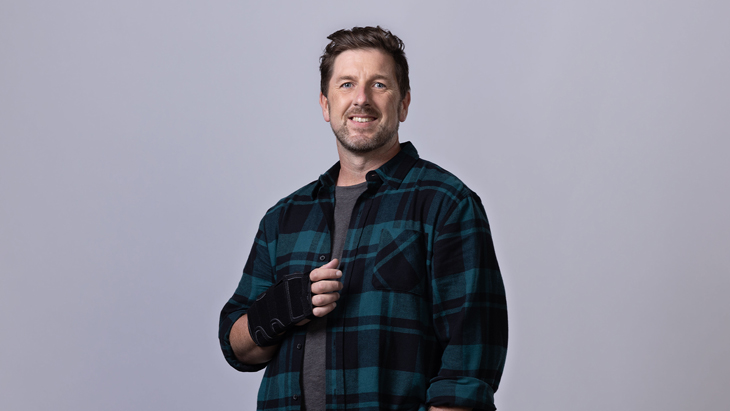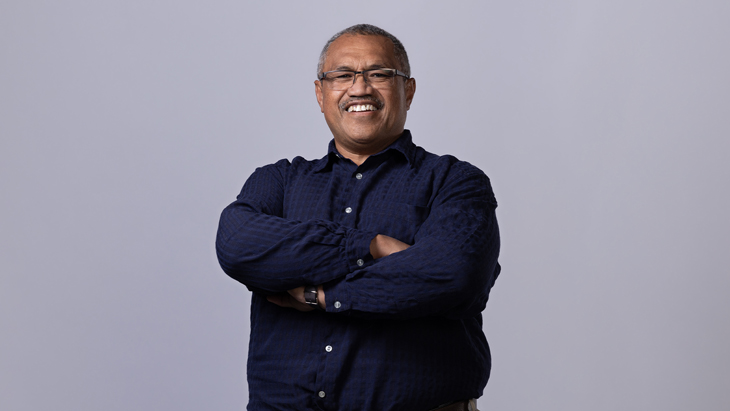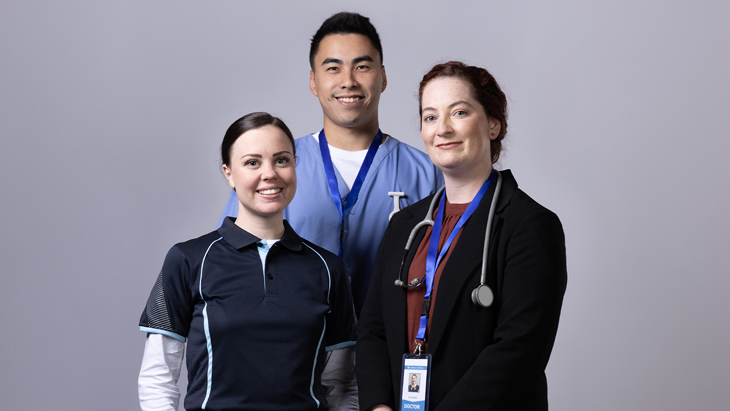Teamwork makes recovery work
Kia mahitahi, kia whakaora
If you’re injured and can’t do your usual job, learn what to do while you recover. Or if one of your employees is injured and needs time off work, see how you can help their recovery. It takes a team effort.
Why recover at work?
An injured person may not be able to do their usual work. But doing some tasks can help them get better, sooner. There's also strong evidence it benefits their physical and mental wellbeing.
It could also mean earning up to 100% of their pre-injury income.
For employers, involvement in an employee's recovery means retaining vital skills and knowledge. It also fosters a positive work environment.
In most cases an injured person can recover safely at work. This might mean some temporary adjustments. To do it successfully takes a team effort from:
- the injured person
- their employer
- their health provider.
As well as the support of whānau and workmates.
Watch how it takes a team to support an injured employee
Video transcript for Teamwork makes recovery work
Visual
We see a large warehouse with a row of five chairs and a row of six stools behind them.
Cameron is sitting in the middle seat of the front row with his hand and wrist in a black brace.
Narrator
Unfortunately, injuries can happen. And that may mean that you’ll need some time off work while you recover. But evidence shows, getting back to it sooner and recovering at work has positive physical and mental health benefits.
Visual
Cameron’s boss comes in and gives Cam a fist-bump and a warm hug.
He sits next to him and puts a sign at Cam’s feet. It reads 'Cameron Bruce's Recovery Team'.
Narrator
You won’t be expected to do your usual job if you’re not up to it, but you could take on some different mahi that suits your condition, or even train and mentor others. And when you are ready, studies show that recovering at work means you’ll be much more likely to return to your old job than if you recovered at home.
Visual
Cam’s whānau also come and sit in the middle front row around him. There’s a young daughter and his partner. They exchange loving hugs and greet the boss warmly.
Two workmates come into the scene wearing their high-vis vest and helmets. They both say hello to Cam and stand behind him.
The boss hands Cam an iPad and lets him know there’s a couple of things to look at on it.
Cam’s health providers walk into the scene, his GP, Physio, and nurse. They say hi to Cam and check how he’s doing. They all stand in the row behind Cam.
Narrator
And because you’re working, we can top up what your employer contributes, so you could earn up to 100% of your pre-injury income.
Visual
Two ACC workers come into the scene, shake Cam’s hand and move into the back row.
Narrator
On top of that, there’s the positive physical and mental aspects of staying connected to your workplace. You’ll get out and about, spend time with your mates, maybe make some new ones who like to chat, and have something to get out of bed for, which all contribute to a better recovery.
Visual
A lady comes into the row behind Cam and gives Cam a warm hug.
An office worker walks into the scene. He squeezes into the row behind Cam to say hello to Cam and others in the group.
The GP helps the lady take her seat in the front row.
The lady offers Cam biscuit from her plate of biscuits
Narrator
It’s also good for employers. They get you back sooner to keep up productivity and have your skills and knowledge around the place. And it’s great for everyone else's morale to see an injured colleague get back to work.
Visual
Cam offers his daughter a biscuit.
A workmate gives Cam an update about work. Cam notes the update on his iPad.
The screen on the iPad shows a list of tasks. The heading on the screen changes from To Do to Done as Cam ticks the box to show the task is completed.
Two more workmates walk into the back row.
We see all the different people smiling and saying hello each other. A couple shake hands.
Narrator
But you can’t do it alone. You’ll need some help from everyone - doctors, physios, mates, whānau, and of course the boss.
Visual
One workmate reaches over to ruffle Cam’s hair to say hi.
The camera moves out to show the full group and everyone starts to settle, ready to take a photo.
We see the back of a photographer, about to take a photo.
Narrator
So take some time to find out more, and learn about your role on the team, because teamwork makes recovery work.
Visual
There’s a flash and then we see the ‘team photo’.
The boss looks at his watch and everyone starts to leave the scene and get back to work.
A graphic shows
Kia mahitahi, kia whakaora
Teamwork makes recovery work
If you’re injured and can’t do your usual job, watch and learn what to do while you recover. Or if one of your workers is injured, see how you can help their recovery.
Carl’s story: ‘Recovering at work kept me sane’
Video transcript for Carl’s story
Visual
The screen shows a man walking towards a rugby field. Screen changes to a mid-up shot of Carl Perry, PE teacher and director of rugby at St Peter's School, Cambridge.
Transcript
Carl: I think I would’ve been in a pretty dark, challenging place if I hadn’t been able to come to work.
Visual
The screen shows mid-shot of a group of young rugby players, tackling and passing the ball on the field. The screen changes to a shot of Carl holding a rugby ball chatting to a man on the field.
Transcript
Carl: Recovery at work was a great option, mainly because I was so well supported in my role.
Visual
The screen shows mid-shot of Carl and his team huddling together as he speaks. The screen changes to a shot of Carl in his classroom briefing students, followed by shots of him in his office and walking down the hallway of the school.
Transcript
Carl: I was actually able to be out on the field with the team or in the gym with the class.
I think it kept me sane, rather than sitting on the couch knowing my work is going to pile up, who’s going to do my admin, who’s going to cover my classes?
Visual
The screen shows shot of a woman, Te Aroha Keenan, director of sport at St Peter's School, Cambridge, seated in her office speaking to the camera. The screen changes to shots of Carl on the field with students.
Transcript
Te Aroha: He loves getting involved and he loves our students.
Any time he can get in front of them, he always presents the best, you know, of himself.
Visual
The screen shows Carl seated on a chair on the rugby field speaking to the camera. The screen changes to shots of Carl playing netball. Followed by photos of Carl in the hospital and with a cast on.
Transcript
Carl: I was playing social netball for a sports department team and then just went to take off to catch the ball, then it all just came tumbling down.
It just felt like someone had ran from the back wall and kicked me right in the Achilles and it was fully ruptured.
That’s probably the worst injury I’ve had in my time playing sport.
It was tough but once we got to A and E and got it all in a cast, then I kind of worried about like, oh no, what’s going to happen at work? I need to get there, I’ve got too many jobs to do.
Visual
The screen shows Te Aroha Keenan, seated in her office speaking to the camera. The screen changes to shots of Carl on the field with students.
Transcript
Te Aroha: He did his Achilles, which was tragic for us because we knew what his involvement was in the sport and coaching and PE teaching – all that kind of stuff.
We knew it was going to be hard for him to stop and just not do anything.
Visual
Photo of Carl’s cast and moon boot.
Text on screen: Carl talked to his doctor about a Recovery at Work programme, which allows people to do alternative duties or reduced hours while they recover from injury.
A moving shot following the road passing the St Peter’s Cambridge school.
Text on screen: Research shows recovering at work can be good for an injured person’s physical and mental wellbeing – and can help them get better, sooner.
A moving shot of the school’s empty football and rugby fields.
Text on screen: ACC can provide a rehabilitation programme, financial support, equipment and help getting to and from work.
Visual
The screen shows Carl seated on a chair on the rugby field side on, changing to Carl speaking directly to the camera.
Transcript
Carl: He put me on a light duties medical certificate, so it meant I could actually be at work.
When I passed this on to my line managers, they were real supportive.
Visual
The screen shows Te Aroha, seated in her office speaking to the camera. The screen changes to shots of Te Aroha and Carl having a conversation.
Transcript
Te Aroha: We always discussed with him, you know, where are you at at this stage? What has your physio said? What has your doctor said? Have you been signed off? What support have you got? Do you have to use the crutches, because you’re not using them right now?
Those sorts of things, so those checks and balances with him.
Visual
The screen shows Carl walking through the gate of his home, embracing his young daughter.
Transcript
Te Aroha: He could do a lot of the stuff that he was doing at home, in the comfort of his home with his leg up.
Visual:
The screen shows shots of Carl at home playing with his three young daughters, followed by a shot of his wife Anna Perry playing with their daughters.
Transcript
Carl: I think home time was probably the toughest. My three little girls are full of energy and they mean the world to me.
So not being able to be like 100 per cent engaged in changing nappies or bedtime or those little things, that was pretty challenging.
And just seeing my wife having to step up and do all of that, that was pretty tough.
Visual
The screen shows shots of Anna Perry, Carl's wife, at home speaking to the camera followed by a shot of Carl and Anna seated on the floor whilst playing with their three daughters.
Transcript
Anna: Yeah, the hardest thing was managing the kids, getting to appointments when we don’t have family here in Cambridge. So that was just us going to all the appointments, Carl out of action, me managing the household.
Our oldest one, Bella, had just started school – it happened on her first day of school. So that was all new, we were just sort of transitioning into that.
So it was, yes, a bit of a stressful time.
Visual
The screen shows a wide moving drone shot of the rugby field.
Transcript
Te Aroha: If there were things to be put out or cones to be put out, we did them for him or set up for the day.
Visual
The screen shows Te Aroha, seated in her office speaking to the camera.
Transcript
Te Aroha: Other staff would go in and do those sorts of things and ensure that he was sitting on a chair and putting his foot up whenever he could.
Visual
Slow motion shot of Carl facing the camera with the rugby game in the background.
Test on screen: ACC also played a key role in supporting Carl’s recovery.
Visual
The screen shows shots of Carl getting physiotherapy on his leg. The screen changes to moving shot zooming out of the school, followed by images of Carl in crutches over the shot.
Transcript
Carl: ACC was great, obviously made sure my injury was covered first and foremost. And then in terms of making sure I had regular physio appointments.
When I tried to be a hero on crutches and felt like I needed something else.
Visual
The screen shows a bird’s eye view wide moving drone shot of the school.
Transcript
Carl: I got in touch with them and they were able to provide me with a knee scooter to help me get around the school.
Visual
The screen shows Carl on a physiotherapy table with Lucarne Dolley, his physiotherapist, inspecting and massaging his leg.
Transcript
Lucarne: It’s looking a lot less thick through here aye, than it was.
Carl: Yeh, definitely, but compared to the other side, it’s still way, way thicker.
Visual
The screen shows a poster of ‘The Muscular System’ followed by shots of the physio office. The screen shows Lucarne Dolley seated by the physio table speaking to the camera.
Transcript
Lucerne: I think recovery at work is super important because that’s a huge part of all of our lives.
It’s huge socially, like mental health-wise as well, getting people back to what they enjoy and what kind of gives them a purpose.
Visual
The screen shows Carl on a physiotherapy table with Lucarne Dolley, massaging his leg. The screen changes to shots of Carl exercising and in the gym.
Transcript
Lucerne: It also kind of prompts things like actually, this is something new, I need to be able to do this and that can kind of give us some goals to work towards as well.
Visual
Slow motion shot of Carl on the rugby field.
Text on screen: Most injuries are preventable – and Carl has some wise words on staying injury free.
Visual
The screen shows Carl seated on a chair on the rugby field side on, changing to Carl speaking directly to the camera.
Transcript
Carl: If I was to look back now on when I did my injury, maybe I wasn’t as prepared as I could’ve been.
The older you get, the more you actually have to look after yourself, warm up, make sure every muscle’s firing.
So I think that’s one key point.
Visual
Slow motion shot of Carl, his wife Anna and two of their daughters sitting on the step of their deck. Followed by a blue screen.
Text on screen: Recovery at work takes a team effort – from the injured person, their employer and their health provider, as well as whānau and workmates. Learn more about what role you can play in recovery at work at acc.co.nz. Helping people recover at work. It’s what we’re doing right now.
Ends
When PE teacher Carl Perry ruptured his Achilles, he was worried about taking time off work. But going on a Recovery at Work programme helped him stay on top of his tasks and remain socially connected, giving his physical and mental wellbeing a boost.



